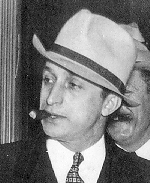
After returning from military service in the First World War, David T. Wilentz graduated from New York University Law School and was admitted to the bar in 1919. A devout Democrat, Wilentz’s dedicated service to the party led to his appointment to Attorney General of New Jersey a year before the Hauptmann trial began. He was only 38 years old.
Although Wilentz had never before tried a criminal case, he was convinced that he could convict Hauptmann and send him to the electric chair. Labeling Hauptmann “Public Enemy Number One of the World,” Wilentz sought to secure a conviction – based upon what was essentially circumstantial evidence – with the aid of both expert and eye-witness testimony.
At trial, Wilentz utilized the expertise of Albert Osborn, a handwriting expert who testified that Hauptmann had written the ransom notes received by both the Lindberghs and Dr. John Condon. Arthur Koehler, a wood expert employed by the U.S. Forestry Department testified that the pieces of wood used to construct the home-made ladder found at the Lindbergh estate came from the wood in Hauptmann’s attic. The last of Wilentz’s star witnesses, Dr. John Condon, testified that Hauptmann was the individual with whom he had met and to whom he had given the ransom money. Hauptmann was convicted.
Wilentz later entered private practice and remained active in New Jersey politics. He died in 1988. His son, Robert Wilentz, also became an attorney and was ultimately appointed to the New Jersey Supreme Court. Interestingly, during the younger Wilentz’s tenure on the high court, Hauptmann’s widow, Anna, attempted to get her husband’s case reopened. Anna Hauptmann’s appeals were denied. Robert Wilentz served on the New Jersey Supreme Court until his death in 1996.
